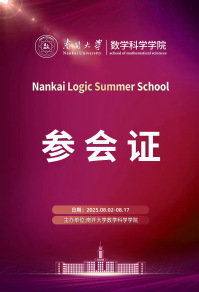Time
lecture1:8:30 am - 10:00 am(GMT+8)
lecture2:10:30 am - 12:00 pm(GMT+8)
seminar:14:00 pm - 16:00 pm(GMT+8)
Location: First Lecture Hall, 2nd Floor, School of Mathematical Sciences
Registration: https://www.wjx.top/vm/YPF4ikM.aspx#
This summer school will be in-person, with no online live streaming available. The courses will be recorded and updated daily.南开逻辑投稿视频-南开逻辑视频分享-哔哩哔哩视频 (bilibili.com)
According to the current regulations, you can enter the campus with the photo below.

Most windows in the school cafeteria support WeChat Pay and Alipay. Open canteen: The first canteen, the second floor of the second canteen, Shixi Restaurant, and the Muslims' canteen.
Unfortunately, we are unable to provide accommodation for non-local students attending the summer school. You will need to book your own accommodation near the school.
The Nankai Logic Summer School will be held from August 4th to August 15th, 2025 at Nankai University. We are honored to have Andre Nies from the University of Auckland and Rizos Sklinos from the Academy of Mathematics and Systems Science, Chinese Academy of Sciences. Everyone is welcome to attend.
Lecturers
Week1:Andre Nies
Andre Nies is a Professor at the School of Computer Science, University of Auckland. His research interests include computability theory, descriptive set theory, and their connections to group theory. He authored the 2009 book “Computability and Randomness”, Oxford University Press.He was a 2010 International Congress of Mathematics invited speaker in the logic session, and received the 2020 Humboldt research award.
Website: https://www.cs.auckland.ac.nz/~nies/
Week2:Rizos Sklinos
Rizos Sklinos is an associate professor in the Chinese Academy of Sciences. His research is focused on geometric group theory and model theory.
Date&Venue
Course Overview
Computability, randomness, and K-triviality
Andre Nies
The first two to three days of the course introduce computability theory: computably enumerable sets, reducibilities, finite injury priority method and other topics. From there on we proceed to more advanced topics. Randomness of infinite bit sequences can be formalised using tools from computability, leading to thefundamental notion of Martin-Loef randomness. K-trivial bit sequences (where the “K” refers to Kolmogorov complexity) are far from random, and at the same time close to computable. Notions from randomness conversely enrich computability, for instance via an easy priority-free solution to Post’s problem.
The course is targeted at students who have at least taken a first course in mathematical logic, and are familiar with recursive functions and Turing machines.
Gromov's Randomness & Model Theory of Groups
Rizos Sklinos
This mini-course consists of two seemingly distant subjects of Mathematics: Geometric Group theory and Model Theory. Gromov in a seminal work (1987) introduced hyperbolic groups and since then they have been constantly in the center of research attention. In order to promote this newly introduced class of groups Gromov stated that if one picks a finitely presented group at random, then it is almost surely hyperbolic. This intuitive statement has been made precise by introducing various models of randomness. The first goal of this mini-course is to introduce the students to the class of hyperbolic groups and the notion of randomness.
On the other hand, in 1946, Tarski asked whether nonabelian free groups share the same first-order theory. This question proved very hard to answer and only after more than 50 years, in 2001, it was answered positively. In voluminous works Sela and Kharlampovich-Myasnikov independently gave proofs that until now have not been completely absorbed. The second part of this mini-course will introduce the students to these techniques and give detailed proofs of the most interesting results we now know about this interesting first-order theory.
In the last part of the mini-course, we will bring, maybe surprisingly,the two threads together. The motivating question is: if we pick a finitely presented group at random, what first-order properties does it have?
Finally, this mini-course is intended for graduate and final year undergraduate students. I will assume a solid background in first-order logic. Some background in group theory and model theory will be helpful.
Day 1: Randomness I.
Day 2: Randomness II.
Day 3: Model theory of Free Groups I.
Day 4: Model theory of Free Groups II.
Day 5: First-order sentences in Random groups.
Schedule
lecture1:
8:30 am - 10:00 am(GMT+8)
lecture2:
10:30 am - 12:00 pm(GMT+8)
seminar:
14:00 pm - 16:00 pm(GMT+8)
